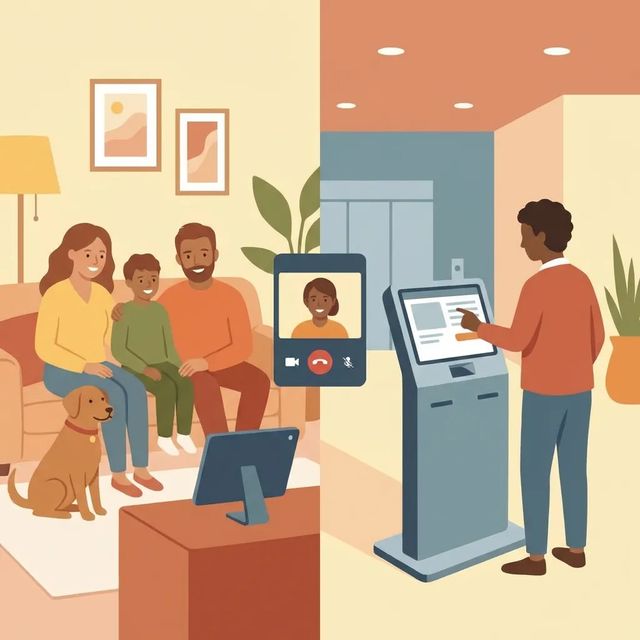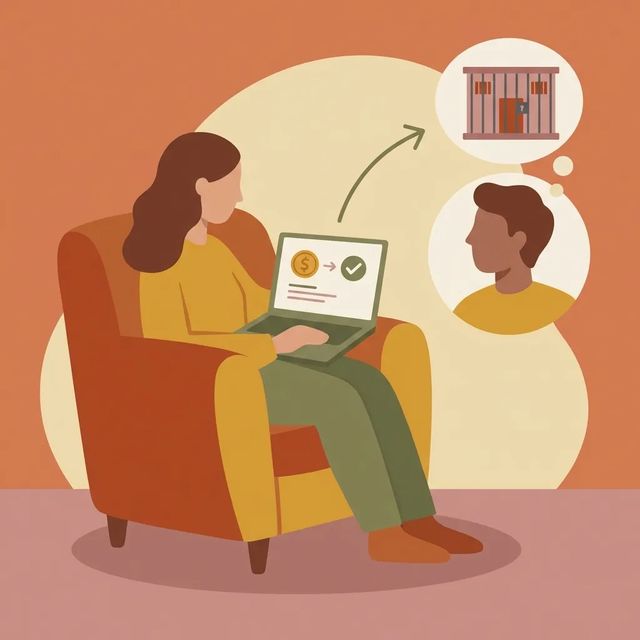Dallas County Jail
Explore
Find an Inmate at Dallas County Jail
Search for a loved one and send messages and photos in minutes.

Guides for This Facility

How to Contact an Inmate at Facility
At Dallas County Jail, your main options for staying in touch are scheduled video visitation and limited in-person visits. Plan ahead and follow the facility's rules to avoid having your visit denied or cut short.
Read Guide
How to Send Money to Facility
Sending money to someone at Dallas County Jail is straightforward once you know what's accepted. Grab the inmate's full name and booking number, then pick the deposit method that works best for you.
Read Guide
How to Schedule a Video Visit at Dallas County Jail (on-site and off-site)
Video visits at Dallas County Jail are straightforward once you understand the system. Here's the exact process to register, schedule, and avoid common issues—whether you're visiting on-site or from home.
Read GuideAt a Glance
Visitation
- Visits are limited to one 20-minute visit per day and no more than four people (maximum two adults and two minors) may visit an inmate at a time.
- Each inmate may receive up to two visits per week, excluding attorneys, law enforcement, or professional visits unless approved by a supervisor.
- Visitors who were incarcerated in a Dallas County detention facility within the preceding six months are not authorized to visit.
Communication
- All on-site and off-site video visits must be scheduled through SmartInmate and scheduled at least 72 hours in advance.
- Each video visit lasts 20 minutes; on-site visits are limited to two per week while off-site visits are unlimited per week.
- Video visits are recorded and monitored; participation constitutes consent to recording and monitoring.
Sending Money
- To deposit money to an inmate account you need the inmate’s name and booking number.
- Accepted deposit methods include in‑person kiosks, CashPayToday (flat $5 fee), AccessCorrections online (as low as $2.95), or by phone at 1‑866....
- Requesting a Dallas County clearance or pardon letter requires a $35 non‑refundable cashier’s check or money order payable to 'Dallas County Sheriff’s Office'; personal checks and cards are not accepted.
Based on official sources and community feedback. Learn how we verify
Topic Overviews
Visitation
Dallas County Jail allows one 20-minute visit per day, with a maximum of four people per visit (two adults and two minors). Inmates are capped at two visits per week. Attorney, law enforcement, and approved professional visits are counted separately. Visitor processing starts 30 minutes before visiting hours. Staff stop processing visitors after 8:30 p.m. on weekdays and after 1:30 p.m. on weekends. If you were incarcerated in a Dallas County detention facility within the last six months, you're not authorized to visit. Once you check in, you must stay inside the building for the entire visit (no in-and-out). Out-of-town residents living more than 75 miles from Dallas may receive a one-time 40-minute visit, with all visits after that reverting to 20 minutes. A conservative dress code applies, many items are prohibited, and visits can be restricted for rule violations or security reasons.
Read full guideCommunication
Dallas County Jail uses Smart Communications (SmartInmate) for both on-site and remote video visitation. You'll need to create a free SmartInmate account and schedule every visit through the system at least 72 hours in advance. Approvals are typically made within 72 hours. Video visitation is considered a privilege, not a right. All sessions are recorded and monitored, and by participating, you consent to that recording and monitoring. Each visit lasts 20 minutes. Off-site video visits are unlimited per week, while on-site visits are limited to two per week. Sign in late and you'll only get the time remaining in your scheduled session. The registering visitor must be at least 17 and show a valid government-issued photo ID at initial registration. Clothing rules apply, and violations can result in bans.
Read full guideSending Money
To add money to an inmate's account at Dallas County Jail, have the inmate's name and booking number ready. You can deposit funds using in-person kiosks, CashPayToday (flat $5 fee), AccessCorrections online (as low as $2.95), or the facility phone deposit line starting 1-866.... Service providers and kiosks charge fees and follow their own processing rules, so stick to the jail's deposit instructions rather than sending money to the facility address. Requesting a Dallas County clearance or pardon letter is a separate process. Submit the completed form with a $35 non-refundable cashier's check or money order payable to "Dallas County Sheriff's Office." The clearance form must be notarized and include a copy of ID plus a second form of identification. Mail or send the original form and payment by courier to the address on the form.
Read full guideCommon Questions
Showing 6 of 9How long are visits at Dallas County Jail?
Regular in-person visits are 20 minutes. If you live more than 75 miles from Dallas city limits, you may be granted one 40-minute visit, then visits revert to 20 minutes. Inmates are also limited to two visits per week overall (attorneys, law enforcement, and approved professional visits are handled separately).
VisitationWhat ID and age rules do visitors need to meet for Dallas County Jail visits?
If you're 18 or older, bring a photo ID such as a valid driver's license from any state or a valid passport. Visitors 17 or younger must be accompanied by an adult (18+). Children under 17 aren't placed on the visitor's card but may visit on weekends when accompanied by a parent or legal guardian who is on the visitor's card and responsible for the child's conduct.
VisitationWhat items are prohibited and can I bring infant supplies into Dallas County Jail visitation?
Many items are prohibited in visitation areas, including tobacco, lighters, e-cigarettes, cameras, recording devices, cell phones, smart watches, backpacks, bags, and purses. If you bring an infant, you may bring one diaper bag (it will be searched), and infant carriers are visually inspected.
VisitationHow do I register and schedule a video visit with an inmate at Dallas County Jail?
Create a free account at smartinmate.com and schedule your visit through SmartInmate. Visits must be booked at least 72 hours in advance, and approvals are generally made within 72 hours. The registering visitor must be at least 17 and show a valid government-issued photo ID at initial registration. Minors need a parent or guardian present.
CommunicationHow long are video visits and are there limits on how often an inmate can have them?
Each video visit is 20 minutes. Off-site video visits are unlimited per week, while on-site video visits are limited to two per week. If you sign in late, you will only receive the remaining scheduled time.
CommunicationAre Dallas County Jail video visits recorded and are there dress or conduct rules I should know?
Yes. All video visits are recorded and monitored. Participating counts as consent to that recording and monitoring. Clothing must not be nude, provocative, or tight-fitting. Violations can lead to progressive bans (30 days, 60 days, then permanent). Check the posted daily on-site video visitation hours and rules, including any restrictions for children, before you arrive.
CommunicationMore Guides
Ready to Connect?
Search for your loved one to start communicating today
Did You Know?
Hospital visits typically aren't allowed. However, the Chief Deputy of Detention Services (or designee) may approve a one-time hospital visit if medical staff determine it's warranted.
This guide is based on feedback from 261 families and official facility documentation. Learn how we verify
